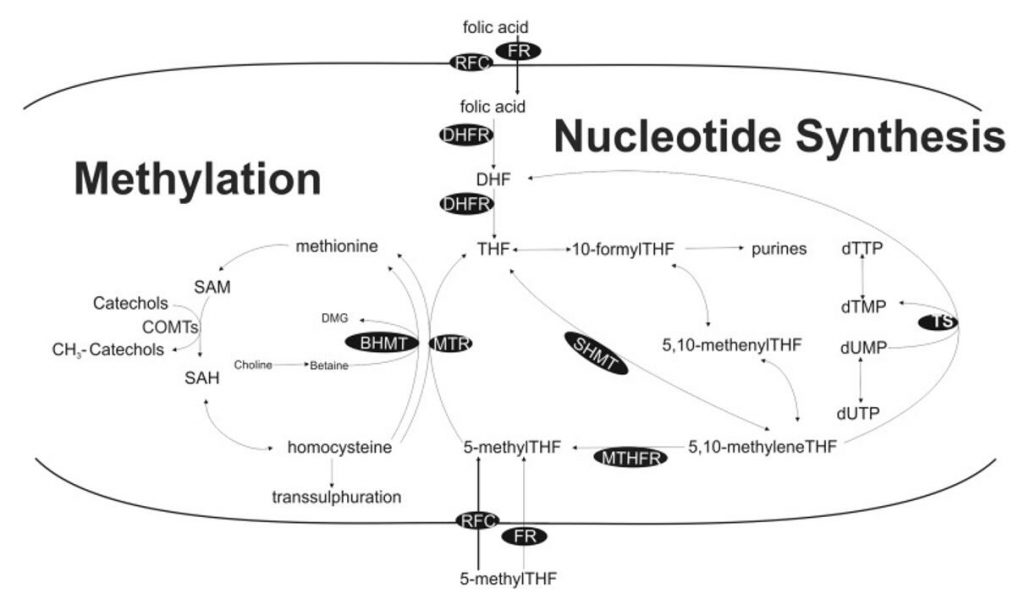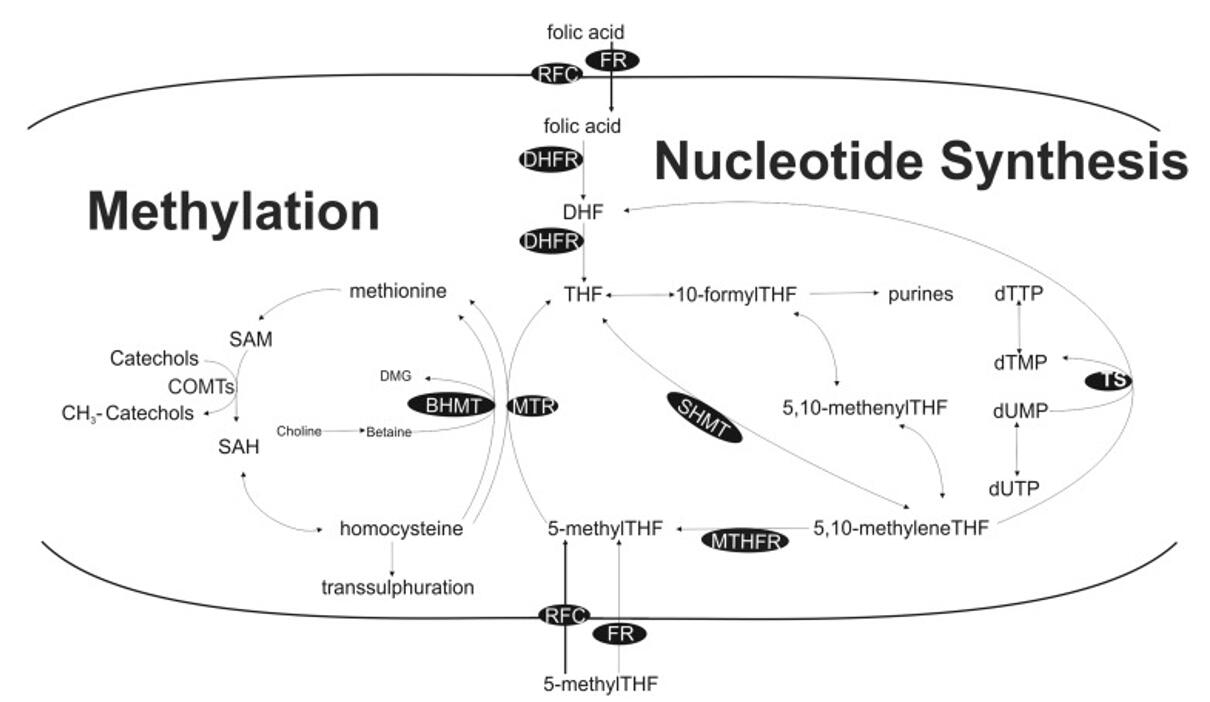Introduction of One-Carbon Metabolism
The fundamental unit of life is the cell, which is a minuscule yet complex biological entity. The biochemical processes within cells form the cornerstone of life, relying on various organic molecules to perform essential functions. These organic molecules include glucose, fatty acids, amino acids, and nucleic acids, which play critical roles within cells. The driving force for these biochemical processes within cells comes from the energy molecule, adenosine triphosphate (ATP). These biochemical processes within cells fall into two major categories, namely cellular respiration and photosynthesis.
Within every cell lies a tiny yet intricate biochemical factory that conducts millions of biochemical reactions every day to ensure the survival and propagation of organisms. One of the pivotal biochemical processes is known as one-carbon metabolism, a multi-step biochemical pathway responsible for synthesizing DNA, RNA, amino acids, and other vital biomolecules.
Roles of One-Carbon Metabolism in Biology
One-Carbon Metabolism is a complex biochemical pathway consisting of several critical steps that are fundamental to the synthesis of important biomolecules in the cell.
A. Methylation Reactions
One-Carbon Metabolism involves a series of methylation reactions where methyl groups (CH3) are added or transferred to various molecules. These reactions are catalyzed by enzymes and play a pivotal role in regulating gene expression, maintaining DNA integrity, and producing essential molecules like phospholipids and neurotransmitters. Methylation reactions are vital for the following:
- DNA Methylation: Methylation of DNA bases, particularly cytosine, is a key epigenetic modification that can affect gene expression and cellular differentiation.
- RNA Methylation: Methylation of RNA bases, such as adenine and cytosine, can influence RNA stability and translation.
- Phospholipid Synthesis: Methyl groups are used in the synthesis of phospholipids, which are critical components of cell membranes.
- Neurotransmitter Production: Methylation reactions are involved in the synthesis of neurotransmitters like dopamine and serotonin, which play important roles in the nervous system.
B. Sources of Methyl Groups
To carry out methylation reactions, cells require a source of methyl groups. These groups can come from various compounds, and their availability is essential for sustaining one-carbon metabolism. Key sources of methyl groups include:
- S-Adenosylmethionine (SAM): SAM is a crucial methyl donor in many methylation reactions. It donates its methyl group to various substrates, forming S-adenosylhomocysteine (SAH) in the process.
- Dietary Sources: The diet provides essential nutrients like folate, choline, and methionine, which can be converted into SAM, thus supplying methyl groups.
- Homocysteine Recycling: Homocysteine, an amino acid, can be recycled into methionine through a process known as remethylation, which contributes methyl groups.
C. Synthesis of Carbon Skeletons
Alongside methyl group transfer, one-carbon metabolism is responsible for the generation and management of carbon skeletons. Carbon skeletons serve as the foundational structures for various biomolecules. The synthesis of these carbon skeletons involves:
- Tetrahydrofolate (THF) Cycle: THF is a critical cofactor in one-carbon metabolism, facilitating the transfer of one-carbon units for nucleotide synthesis, amino acid metabolism, and other essential processes.
- Serine Metabolism: Serine, an amino acid, contributes to the formation of 3-phosphoglycerate, which can serve as a carbon source for nucleotide biosynthesis.
- Glycine and Purine Synthesis: Glycine and purines, important components of nucleotides, are synthesized using one-carbon units.
D. Recycling Reactions
Efficiency is a key aspect of one-carbon metabolism, and this pathway includes recycling reactions to ensure optimal use of resources. These recycling reactions are essential for:
- Regenerating THF: Tetrahydrofolate (THF) is continuously regenerated in the THF cycle to maintain a constant supply of one-carbon units.
- Managing Homocysteine: Homocysteine, produced during methionine synthesis, can be converted back into methionine or other metabolites in the transsulfuration pathway.
Roles of One-Carbon Metabolism in Biology
DNA Methylation: One-carbon metabolism is responsible for adding methyl groups to DNA molecules. DNA methylation is an epigenetic modification that regulates gene expression and is essential for normal development and cellular differentiation.
Nucleotide Synthesis: One-carbon metabolism is involved in the de novo synthesis of purines and thymidylate (a component of DNA). It provides the one-carbon units necessary for the synthesis of these nucleotides, which are essential for DNA replication and repair.
Amino Acid Metabolism: One-carbon metabolism is linked to the synthesis of several amino acids, including serine, glycine, and methionine. These amino acids are crucial building blocks for proteins and other biomolecules.
Sulfur Amino Acid Synthesis: Methionine, an amino acid synthesized within one-carbon metabolism, is a precursor for cysteine and other sulfur-containing amino acids. These amino acids are essential for protein structure and function.
Homocysteine Metabolism: One-carbon metabolism plays a role in the conversion of homocysteine to methionine. Elevated homocysteine levels are associated with various health issues, including cardiovascular disease, making this pathway important for overall health.
Antioxidant Defense: Glutathione, a powerful antioxidant, is synthesized within one-carbon metabolism. It helps protect cells from oxidative stress by neutralizing reactive oxygen species (ROS).
Neurotransmitter Synthesis: One-carbon metabolism is involved in the synthesis of neurotransmitters like serotonin and dopamine. Proper neurotransmitter function is crucial for mood regulation and neurological health.
Histone Methylation: In addition to DNA methylation, one-carbon metabolism also influences histone methylation, another epigenetic modification that regulates gene expression.
B Vitamins: One-carbon metabolism relies on various B vitamins, such as folate, vitamin B12, and vitamin B6, as cofactors. Deficiencies in these vitamins can disrupt these pathways and lead to various health problems.
Epigenetic Regulation: One-carbon metabolism is tightly connected to the regulation of gene expression through DNA and histone modifications. Dysregulation of these pathways can have profound effects on development, health, and disease.

One-carbon metabolism and related biological roles (methylation and nucleotide synthesis) (Jadavji et al., 2015).
The Relationship Between One-Carbon Metabolism and Health
Defects and Diseases
Neural Tube Defects (NTDs): Insufficient folate (a B-vitamin) is associated with an increased risk of neural tube defects in infants. These include conditions like spina bifida, anencephaly, and encephalocele. Pregnant women are often advised to take folic acid supplements to reduce these risks.
Cardiovascular Disease: Elevated levels of homocysteine (a product of one-carbon metabolism) are associated with an increased risk of cardiovascular disease. This is because the accumulation of homocysteine can damage the vascular endothelium and promote atherosclerosis.
Cancer: Aberrations in one-carbon metabolism are linked to the development of various cancers, especially those involving DNA methylation. For instance, colon cancer and breast cancer patients often exhibit DNA methylation abnormalities.
Neurological Disorders: Impairments in one-carbon metabolism may be associated with neurological disorders such as Alzheimer's disease and Parkinson's disease. This is because the pathway is linked to neuronal protection and repair.
Nutrient Requirements
Folate and Vitamin B12: These two vitamins are crucial for maintaining the normal function of one-carbon metabolism. Folate deficiency can lead to NTDs, while vitamin B12 deficiency can impair DNA synthesis and the production of red blood cells.
Choline: Choline is a precursor to the neurotransmitter acetylcholine and is vital for neurological and brain function.
Therapeutic Interventions
Methotrexate: Methotrexate is a medication that inhibits one-carbon metabolism and is widely used to treat leukemia, rheumatoid arthritis, and autoimmune diseases. By interfering with DNA and RNA synthesis, it can inhibit the growth of cancer cells.
Antifolate Drugs: Antifolate drugs are employed to treat various diseases, including cancer and rheumatoid arthritis. They work by inhibiting key enzymes in one-carbon metabolism, thus halting cell proliferation.
Reference
Jadavji, N. M., et al. "Methylenetetrahydrofolate reductase deficiency alters levels of glutamate and γ-aminobutyric acid in brain tissue." Molecular genetics and metabolism reports 3 (2015): 1-4.
